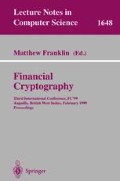Abstract
In this paper, we discuss a process to evaluate the effectiveness of counterfeit detection systems for an electronic cash scheme which is not fully accounted (i.e., off line, peer to peer transactions are allowed, and no shadow accounting for each purse). The process includes a use of a micro dynamic simulator to simulate various counterfeit scenarios (in addition to testing on the actual non-counterfeit transaction data sets from the real deployment) and generate transaction data sets for detection systems to use for the counterfeit detection systems training and testing. A case study of preliminary test results related to the effectiveness of the detection systems in a simulated counterfeit scenario is also provided.
Access this chapter
Tax calculation will be finalised at checkout
Purchases are for personal use only
Preview
Unable to display preview. Download preview PDF.
References
Ezawa, K.J., and Napiorkowski, G., 1998, “Assessment of Threats for Smart Card based Electronic Cash,” Financial Cryptography’ 98.
Ezawa, K.J. and Schuermann, T., 1995, “Fraud/Uncollectible Debt Detection Using a Bayesian Network Based Learning System: A Rare Binary Outcome with Mixed Data Structures,” Proeedings of the 11th Conference Uncertainty in Artificial Intelligence, Morgan Kaufmann, pp. 157–166.
Ezawa, K.J., Singh, M., and Norton, S.W., 1996, “Learning Goal Oriented Bayesian Networks for Telecommunications Risk Management”, Proceedings of the 13th International Conference on Machine Learning, Morgan Kaufmann.
Ezawa, K.J., and Norton S., 1996, “Constructing Bayesian Networks to Predict Uncollectible Telecommunications Accounts,” IEEE EXPERT, Vol. 11, No. 5, pp.45–51.
Maher, D.P., 1997, “Fault Induction Attacks, Tamper Resistance, and Hostile Reverse Engineering in Perspective,” Financial Cryptography’ 97-First International Conference, Springer Verlag.
Author information
Authors and Affiliations
Editor information
Editors and Affiliations
Rights and permissions
Copyright information
© 1999 Springer-Verlag Berlin Heidelberg
About this paper
Cite this paper
Ezawa, K.J., Napiorkowski, G., Kossarski, M. (1999). Assessment of Effectiveness of Counterfeit Transaction Detection Systems for Smart Card Based Electronic Cash. In: Franklin, M. (eds) Financial Cryptography. FC 1999. Lecture Notes in Computer Science, vol 1648. Springer, Berlin, Heidelberg. https://doi.org/10.1007/3-540-48390-X_6
Download citation
DOI: https://doi.org/10.1007/3-540-48390-X_6
Published:
Publisher Name: Springer, Berlin, Heidelberg
Print ISBN: 978-3-540-66362-1
Online ISBN: 978-3-540-48390-8
eBook Packages: Springer Book Archive

